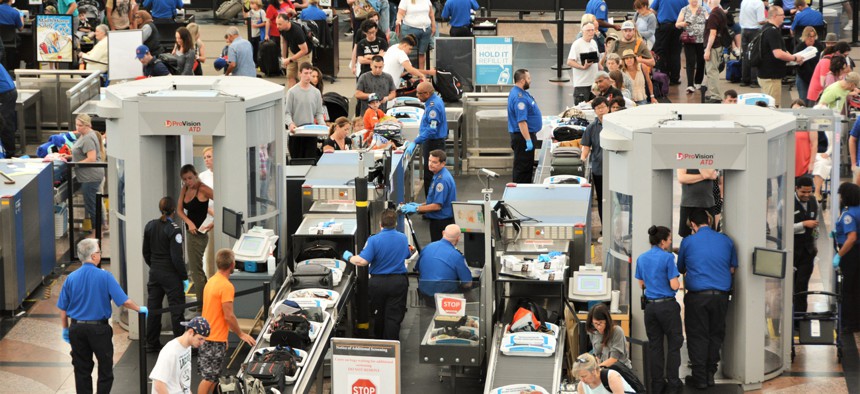
Although Transportation Security Administration screeners, shown here processing passengers at the Denver International Airport in July 2019, are eligible for new parental leave benefits for federal employees, many of their colleagues are not. Jim Lambert/Shutterstock
Feds at Two Major Agencies Would Not Get Paid Parental Leave Under New Law
A law authorizing 12 weeks of paid parental leave for federal workers applies only to Title 5 employees, leaving workers at TSA, FAA and elsewhere fearing they will miss out. Democrats are working to change that.
The Trump administration last month announced that it would provide paid parental leave to federal workers by the end of September, but it turns out the law does not apply to all federal workers. Now congressional Democrats hope to tweak the law to ensure all employees can access the new benefit.
After weeks of negotiations, lawmakers and the White House agreed to include a provision in the fiscal 2020 National Defense Authorization Act that would provide federal employees with up to 12 weeks of paid leave per year in the case of a birth, adoption or foster placement of a child. The provision marks a compromise between Republicans, who were reluctant to include any leave, and House Democrats, who previously passed a measure that would have provided 12 weeks of family leave, including time off to care for an ailing loved one.
But shortly after President Trump signed the bill into law, Democrats discovered that the bill’s language applied only to Title 5 employees, with a few other carve-ins. While Title 5 covers the vast majority of federal workers, it does not include some employees at the Transportation Security Administration, the Federal Aviation Administration, Washington, D.C. courts employees or public defenders. Although TSA screeners are eligible for leave, other employees at the agency are not.
On Dec. 18, one day after the bill was enacted, Senate Minority Leader Chuck Schumer introduced the Federal Employees Parental Leave Technical Correction Act (S. 3104) that would ensure all federal employees have access to the new benefit. Sen. Brian Schatz, D-Hawaii, tried to pass the bill via unanimous consent, but was rebuffed by Sen. Pat Toomey, R-Penn.
“We, on a bipartisan basis, decided to provide paid parental leave of 12 weeks for the federal workforce, 2.1 million federal workers, so that individuals who are new parents don’t have to make that impossible choice between receiving a paycheck and being a new dad or a new mom,” Schatz said last month. “But there was a technical problem, and so a number of federal employees are not going to be covered . . . We can solve that today.”
A spokesperson for Schumer did not respond to a request for comment regarding the path forward for efforts to expand paid parental leave to all federal workers.
In the meantime, the Trump administration has provided some new details about how it will implement the benefit. In a brief memo to agency heads, Office of Personnel Management Director Dale Cabaniss provided a clear start date for the program—the birth, adoption or foster placement of a child must occur on or after Oct. 1.
“The new law applies to leave taken in connection with a birth or [adoption or foster] placement occurring on or after Oct. 1, 2020,” Cabaniss wrote. “The U.S. Office of Personnel Management will issue necessary regulations and guidance to implement this legislation.”
It still is not clear how or if agencies will be expected to temporarily backfill the positions of employees who take parental leave or adjust employees’ workloads across the federal workforce. The Congressional Budget Office estimated that the program would cost agencies $3.3 billion between 2021 and 2024 in employee salaries, although paid leave advocates have argued that the measure will save agencies tens of millions of dollars in recruitment and retention costs.
This story has been updated to clarify that TSA screeners are eligible for paid parental leave, but not other employees at the agency.







